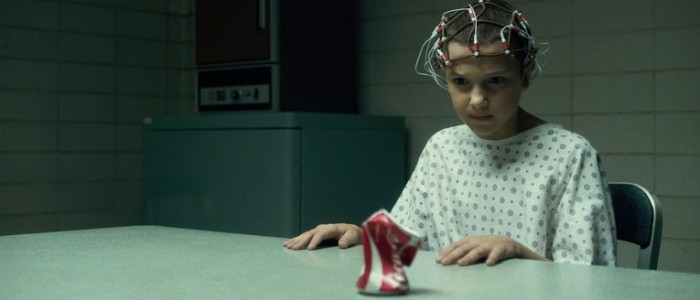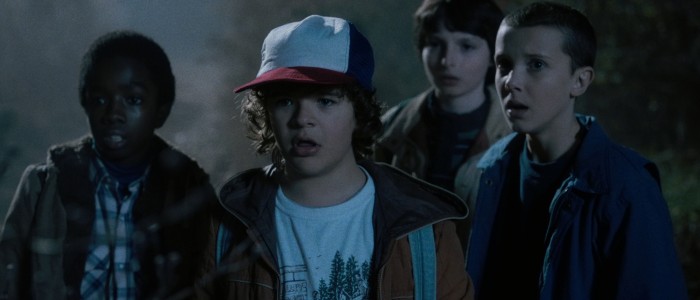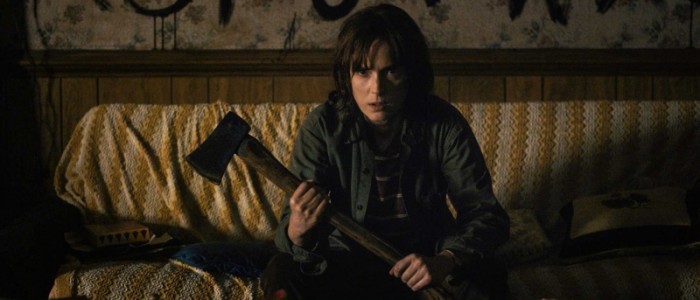Interview: 'Stranger Things' Producers On Influences, Marketing, The Possibility Of Future Seasons And More
If you binge watched Stranger Things this past weekend, then you spent your time wisely. The series' creators, Matt and Ross Duffer, transported Netflix's subscribers back to the 1980s, where kids and government conspiracies run amok. The siblings wrote and directed most of the eight episodes, which, as executive producers Shawn Levy (Real Steel) and Dan Cohen (The Spectacular Now) told us, they approached as an "eight-hour movie."
Levy directed chapter three ("Holly, Jolly") and four ("The Body") of Stranger Things. When I spoke with the director and Cohen, I hadn't seen all of season one yet, so we mainly covered their collaboration with the Duffer brothers and Netflix, the show's references, and what to expect from the future of Stranger Things.
Below, read our interview with Shawn Levy and Dan Cohen.
I'm sure you saw it already, but Stephen King tweeted some kind words about the show.Dan Cohen: That tweet...I mean he is the influence of all influences, alongside [Steven] Spielberg. That tweet went out an hour or two before the premiere Monday night and the brothers couldn't have loved that more, and certainly started the whole wave of press off nicely. So it was pretty awesome.When did you first meet the brothers? When did this all get started?Dan Cohen: I've known the brothers and their work for a while. They had written this script they ended up directing, and it was a really good first movie called Hidden. That was a few years back. But the end of 2014 is when we read this pilot and sat with them and started talking about this project and how to bring it to the world. It was really through that and their ideas of how to make it into a show. When you get to meet these guys, they have such humility and a great understanding of the genre and what they want to do, and a deep love and respect for what they are doing, and it's contagious. You just want to work with them and see them through that journey. It started then. And we took it out to town and then we brought it to Netflix in, I'd say, early March of 2015. They jumped into it and we were off to the races.Mentioning their love for the genre, it's obvious watching the show, but it doesn't only come across as a throwback. Dan Cohen: Absolutely. I think what's important is, obviously, there are influences you can spot and a love for that world and period. And the music is a glorious symphony, yet it still feels emotional and conducive to the storytelling. But we didn't want it to just be a novelty. We wanted it to be, and I quite think it is, a standalone story that just works for having to take place in Indiana in 1983. Independent of those influences, I think the guys did an amazing job crafting a very smart way in of an ordinary group of people dealing with extraordinary circumstances. The kids are great. How long did it take to put that group together? What about Millie Bobby Brown made her stand out? Dan Cohen: The search for the kids in general, and including especially Millie, was a long and exhaustive one. Carmen Cuba, who worked with the Duffers before, and has worked with Netflix, and also casted The Girlfriend Experience, has an amazing eye for talent. The Duffers had to really push themselves to make sure that these kids felt like kids and could act, and that it would feel effortlessly organic to 12-year-old friends.
The kids are great. How long did it take to put that group together? What about Millie Bobby Brown made her stand out? Dan Cohen: The search for the kids in general, and including especially Millie, was a long and exhaustive one. Carmen Cuba, who worked with the Duffers before, and has worked with Netflix, and also casted The Girlfriend Experience, has an amazing eye for talent. The Duffers had to really push themselves to make sure that these kids felt like kids and could act, and that it would feel effortlessly organic to 12-year-old friends.
With Millie, she's an incredible actress and has such a real onscreen persona that is very unique and rare. And so much of her character isn't done through dialect but, in fact, emotion and what's going on within her. That is not an easy thing to find. And yet, as you've seen in watching the show, Eleven is an integral piece of the show that really ties many storylines together. To have a character that is so specific and kind of a fulcrum of the show and, yet, is not giving monologs, that's a unique piece of casting. We are so lucky to have had her. The Duffers and Carmen just nailed it in casting. She's a terrific young actress, and she really nailed it.
[Spoilers ahead for episode 3.]
In the third episode, "Holly Jolly", when she snaps that man's neck, you still feel empathy for her, especially because of her reaction.Shawn Levy: I literally joined you right as you were describing one of my favorite moments when Eleven breaks that fucker's neck.[Laughs.] Do you recall any notable tidbits about filming that scene?Shawn Levy: First of all, nice to meet you over the phone. It was Millie's idea to do that gesture with her head to break that dude's neck.
[End spoilers.]
When you all first met with Netflix, how did the pitch go? What did you all do to sell them on the show?Dan Cohen: They are the dream house. Shawn and myself and the Duffers definitely went back and forth intensely to make sure this went as well as it possibly could. But it was a warm meeting. They had obviously read the script. The brothers had created sort of a mock trailer that was quite fantastic and had an outline, and they had just seen their movie. It was a warm room. And Shawn is an incredible salesman in the room. But I think that we were able to just highlight where we wanted to go.
And to Netflix's credit, they were asking great questions and were very passionate about it from just a first meeting, not yet officially being in business kind of level. Even though we wanted to go with them undoubtedly, when we jumped in with them we knew they were coming from the right place with it.
Shawn Levy: The way these things work, especially in a pitch like this where the network has already read the pilot, you spend your time talking about where you think the characters will go, what you think the style of the show is. We declared some pretty bold ground rules, starting with the fact that we didn't anyone to direct it except the Duffers or me. We really, really wanted to approach it like an eight-hour movie.
They were the very first choice. They were our very first pitch. And they bought the entire season within 24 hours. We never had to pitch a second buyer.
 It's funny you say it feels like an eight-hour movie, because while watching it, I thought it'd play just as well in a theater. You would think it was made for the big screen. Shawn Levy: You know what we did? For the premiere two nights ago we showed the first two episodes on the big screen. It's a way that very few people will get to watch this show, unless, of course, it becomes a classic and then people hold like marathon screenings in a movie theater, which I hope happens.
It's funny you say it feels like an eight-hour movie, because while watching it, I thought it'd play just as well in a theater. You would think it was made for the big screen. Shawn Levy: You know what we did? For the premiere two nights ago we showed the first two episodes on the big screen. It's a way that very few people will get to watch this show, unless, of course, it becomes a classic and then people hold like marathon screenings in a movie theater, which I hope happens.
At every turn, the Duffers and we were determined to not have this feel like typical television. That meant that the visuals are a little bigger and a little more iconic. It meant that the approach to the score is completely untraditional for television. It's all two guys and all electronic. It meant in casting we saw hundreds of kids, and we turned down dozens of kids who were brilliant. But we turned them down because we needed more than talent. We needed authenticity.
So with every key decision, we really tried to think of it like a very long movie that would be parceled into eight sections. That was our guiding mandate.
It's unfortunate to know that, say if you or the Duffer brothers tried to make Stranger Things as a movie, it'd be tough to get made. Shawn Levy: Here's the thing. The day that the Duffers stop doing this show, they will be directing movies. That is inevitable now and deserved. But the sad truth of the movie business is we could never get this made as a movie. In the movie business, unless you are a superhero, a franchise, or a fairytale, it is almost possible to get made at a studio.
The great news is that when we come across material that deserves to see the world and that the world deserves to see, we have a variety of television outlets available. And there are other ways to finance a movie, which is how we did our Denis Villeneuve movie [coming out] this fall, Arrival. At first, it wasn't going to be in the studio, so we had to finance outside the system. The good news is that there are lots of options.
The sad case, and I say this as someone who has spent my career making those popcorn studio movies, like, the number of movies that they make, the range of movies that they make has gotten more and more narrow. So I'm thrilled that we have places like Netflix to make cool shit that the studio may not want to spend on.
The marketing did a nice job of reflecting the tone and spirit of the show. How involved were you guys and the Duffers in the trailers and posters? Shawn Levy: Very. Let me be very clear in this answer. First of all, for years and years I learned early in my career that if you don't sweat the marketing, if you don't worry about the marketing as much as the product itself, you are cutting off your own nose to spite your face. So I get very involved.
And to Netflix's credit, every single poster design, every single trailer edit, every single featurette, they sent me, Dan, and the Duffers, so that we could give notes or vetoes or suggestions. So every single piece of marketing you are seeing has been influenced and approved by us producers, which is fantastic to feel that level of partnership.
What sort of shooting schedule did Stranger Things have? Shawn Levy: The two things that were unusual...Well, we had 11-day episodes. So I think that's a little more than a typical series. Maybe not by much, though. So 11 days per episode. The thing that is awesome about Netflix and simultaneous launch of all episodes is when we would finish episode 1, or 2, or 3, or 4, we didn't need to deliver it until the very end of post-production because they are all going out on the same day.
So what we did is we did early cuts on 1, 2, 3, and 4, but then we sat on them. And then we finished the shooting, the Duffers and I, with Dan and our editors, were able to edit 5, 6, 7, 8, but we were able to go back and watch 1-4 and make tweaks now that we knew the whole picture.
So it was a great way to work. You didn't have to feed the beast with every episode every few weeks. You could do some work, put it to the side, and then revisit it at the end of the road to make sure it all fits. And that's very much how we did the series.
 People are responding really well to Kyle Dixon and Michael Stein's score. How did they get involved? Dan Cohen: The score, as you can tell, is obviously a very important piece of the show. I love when you have something and you have the music and the score that is the backbone of the show. From very early on when these episodes were being written, the Duffers were very, very driven to find the perfect musicians for this. It was a long conversation about: Who was it? And how could it be of the era and yet emotional? Which was very important and something that Shawn brought up right away.
People are responding really well to Kyle Dixon and Michael Stein's score. How did they get involved? Dan Cohen: The score, as you can tell, is obviously a very important piece of the show. I love when you have something and you have the music and the score that is the backbone of the show. From very early on when these episodes were being written, the Duffers were very, very driven to find the perfect musicians for this. It was a long conversation about: Who was it? And how could it be of the era and yet emotional? Which was very important and something that Shawn brought up right away.
We came across these guys from the band SURVIVE. They had scored the movie The Guest several years ago, which is an amazing movie and an incredible score. And the guys did an amazing job. Just the opening credits...but they were able to really cover a texture that not only gives a not to that period, but I think also serves as an emotional storytelling device and a real core piece of the show, I think almost as a character. There were three storylines going on independent of one another for a while, and they bridge together in the sort of third act of the show. And I think one of the main things that connect them beyond family blood is this score that's kind of guiding them all together.
Is Stranger Things a show you'd both say fans should watch a second time? Is it packed with Easter eggs or background details that'll stand out on repeat viewings? Shawn Levy: I would say this, because obviously, we've had the luxury of watching these episodes repeatedly. The Duffers definitely do not conscientious Easter egg hiding. They just don't operate that way. They are very, very character anchored storytellers. But you will, upon future viewings, certainly notice little tidbits of production design that give authenticity to the setting that you don't notice in a first viewing.
And the other thing you notice, and actually is pretty awesome, is you'll see setups in early episodes for things that pay off later that you may not even notice are setups or foreshadowing. But those are all over the place. And that's fun once you start noticing the way we're leaving breadcrumbs...not breadcrumbs to be tricky or cute, but breadcrumbs to set up a foundation for moments and character payoffs that come later, notably with Hopper. From episode 1 we get a sense of his haunted past. By the time you get to episode 8, you have a satisfying revelation and catharsis of that. That stuff all becomes much more visible once you watch it a second time.
Where do you both see this show going with the Duffers? Do they envision it as a few seasons following the same characters?Shawn Levy: Yes. The answer is yes and yes. We definitely are hopeful to go several more seasons. And the plan is to continue with this set of characters while introducing a few critical key new ones next season. So I'll just say that a lot of the big mysteries get answered at the end of Season 1, but we are very much kind of unearthing new problems and questions that merit future stories and future investigation in the most enjoyable way. So we are in love with our cast and our characters.
Things end up being resolved to some extent at the end of Season 1, but not entirely. And that's why we're so hopeful we get another few seasons to live with these people a little longer.
***
Stranger Things is now available to stream on Netflix.
